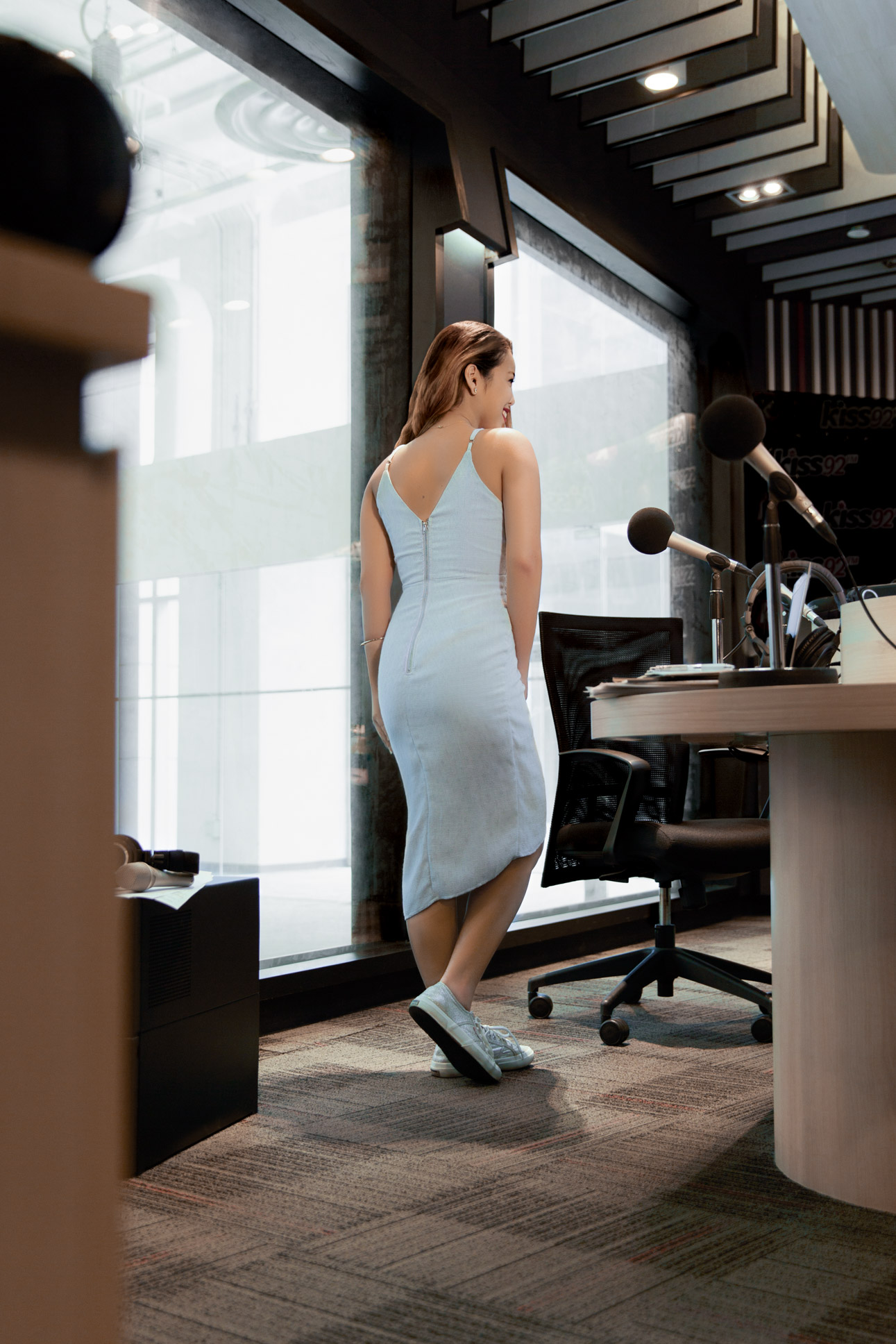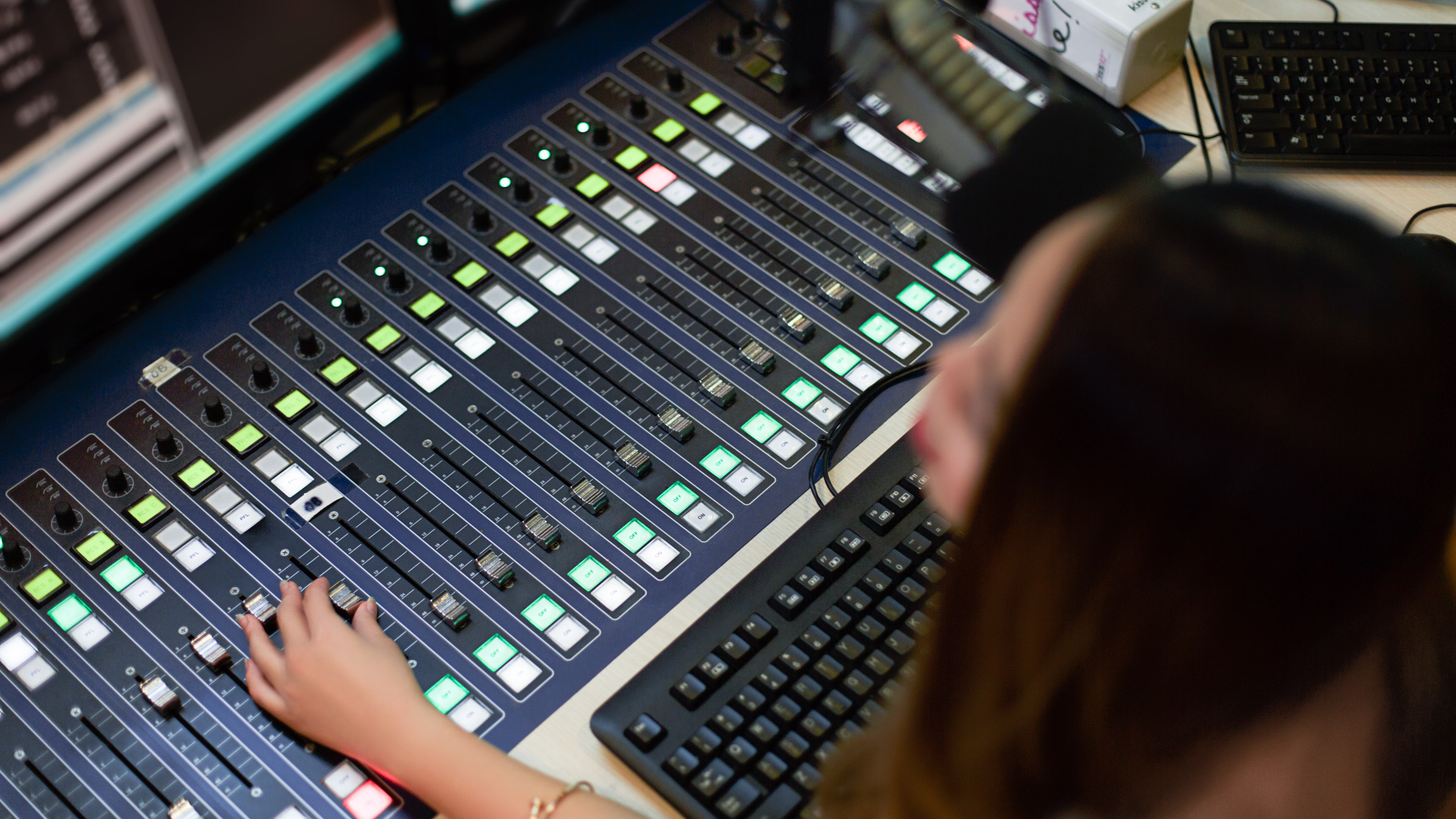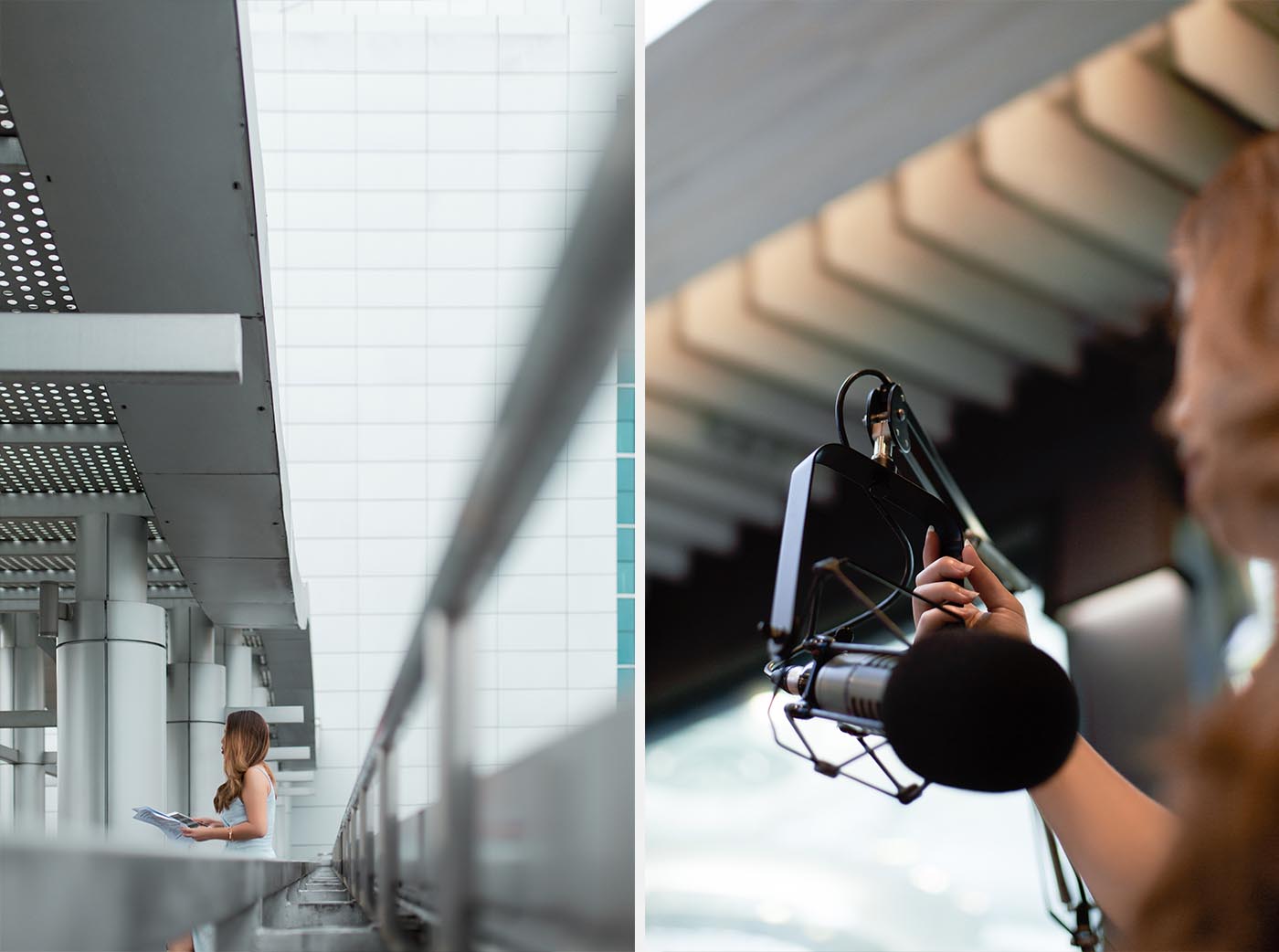UOB One Account x Shentonista — Word Of Mouth


Charmaine, Radio Presenter.
Shoes from Superga, bracelet from Anarchy Street, earrings from By Invite Only.
We’d never realised how much energy it takes to be a radio presenter until we saw Charmaine at work. It’s not easy to keep up your spirits when you’re faced with an empty studio and four blank walls, having to smile into the microphone and make sure that you always sound incredibly enthused about whatever you’re speaking about, while you’re not even certain that your audience is enjoying the show or even paying attention. There’s a hidden side to the job as well that few people get to see—the recording, the editing, the research that goes into the next newsworthy soundbite. But this is a job Charmaine seems born to do; something that she loves doing, and, as she explains as we speak to her, something that comes with its own little set of rewards.
How did you become a radio presenter?
Many years ago, my drama teacher in secondary school told me that my voice would become my asset. I didn’t quite understand it then—I just thought I had a low voice, no big deal. I knew at that point, though, that my gift of the gab would get me out of most trouble. I actually thought I would be a lawyer. But somewhere along the way I read that to be a newsreader you have to get a degree in Politics and Communications, and that’s what spurred me to go to Melbourne University to do my double major. When I came back I told myself I’d be the next big newsreader until I realised that there was too much seriousness in the job, and I knew that I probably couldn’t handle it at that age. I still wanted my own show, though—to use my personality and my voice for something, and I thought: give radio a shot.
What did your parents think then?
I was fresh out of university, and my lovely parents said, “It’s a corporate job or nothing.” I had no choice and went to work in a media agency. But I told myself that I had to live for something. I went for a radio course at a radio station and they liked my voice, and asked “Why don’t you do weekends for us?” So I was 21, and while people were out partying and clubbing, I started doing shifts on Saturdays and Sundays, getting some experience. I was thrown into the deep end, and there’s no better way to learn, to be honest. I’ve been a radio presenter for nine years now.

What does your family think about your job now?
When I first started radio my mum gave me a six-month timeline. She said, “Prove to me that this makes money, otherwise, you leave, and you’re back in the corporate world.” So I worked my butt off in those six months, showed that it more than paid the bills, and since then we’ve never had that discussion again. My parents are very supportive. My mum especially—she knows when I’m on Facebook Live, and she’s on Instagram and knows which guests I have on my show. My dad tunes in to listen too; they’ve made a switch from a station that was for an older crowd. It’s quite cute! I think we had a conversation about who Justin Bieber is at some point. It’s nice to know that they do support me.
Have you always been comfortable talking to people?
My dad would say that I always talked back when I was younger. He always said to me, “One day, your mouth will get you into trouble.” It gets me into trouble once in awhile but I can safely say, about 20 years later, that speaking and my voice has definitely gotten me into good things, lah. While the job involves talking to thousands of people each time, I’m quite an introvert. When we host, we’re ‘the life of the party’, so to speak, so in my personal time when I’m with my friends I’m a bit more chill. There’s an ‘on-air’ and ‘off-air’ personality for me.
What are some things people don’t know about being a radio presenter?
Oh—most people think that we just talk. While that is partly true, I think people forget that our job has two titles: Producer/Presenter. People think it’s all glitz and glamour—it sounds great to get to interview Ed Sheeran for 15 minutes. However, people have very short attention spans when it comes to radio, and we may have to chop that 15-minute soundbite into three minutes. Sometimes the audio’s not great, sometimes the microphone fails on you—I’ve learnt that there are so many problems that can happen. People also think that this is a very chill job, but the fact is that it’s still nerve-wracking, every day. I think the day you don’t get nerves is the day you should quit the job. You’ve got to have that bit of adrenaline to know that this is ‘live’, and that people are tuning in to you regardless of what they’re doing. You’re part of someone’s day, and there is responsibility and a bit of stress in that as well.

Most of the time you’re alone in the studio and talking to yourself—how do you make sure you still sound engaging?
It’s really difficult when you’re surrounded by four walls to know that you’re talking to thousands of people at the same time. I think it’s very easy to talk at people, but to talk to someone is a bit different. I always pretend that I’m talking to a good friend, like I’m catching up with them or I’m excited to share news. We might be talking to many people but in a way, it’s like we’re forging friendships. Sometimes people come up to us outside and they feel like they know us; that they’re our friends.
How do you keep your energy up all the time though?
Of course, not everything is exciting. And you have days or weeks when you just don’t feel like being on air; you don’t want to smile, so you have to psych yourself up for it. Different DJs do different things—I always watch funny videos. When I’m in a not-so-good mood or if something’s getting me down, I watch the Ellen (Degeneres) Show. She lifts my mood instantly. Otherwise, I go to several YouTube channels that I know will guarantee a chuckle. That’s when I’d be like, “Okay, I’ve been entertained, and now it’s my job to entertain everybody else.”
What’s one thing you’ve learnt from your time at work?
That when you make a mistake, the easiest thing to do is to first of all laugh it off, and then recover from it. Sometimes it’s actually quite funny, and that’s when people appreciate that we’re ‘live’. If we read from a script, it’s going to be perfect. If we go off the cuff, then we will make mistakes.

Do you have any advice for anyone who wants to be a radio presenter?
It’s hard work, so you must love connecting with people. If you don’t like that, you won’t last very long in the industry.
So what drives you to do what you do what you do, day in and out?
Sometimes we do wonder if people are listening—I mean, yes, we get the statistics and we know people are tuning in—but now and again you get an email or SMS from people who say, “I listen to you every day, and you’re the best part of my day” or “Work gets really stressful and your show is what keeps me going”. It’s stuff like that bolsters you when you’re wondering to yourself, “What am I even doing in this job? I’m just talking.” We might be in the background for most people, but to know that you’re actually part of someone’s day—that’s what keeps me going.
What are you working hard for?
I hope to inspire the next generation to speak well—to have a little bit of humour and intelligent wit, if that makes sense. I grew up in the era of radio where the presenters spoke very well. I’m also very close to my family and I would like to give back, so every time I can, I’d bring them out for meals. I’m also hoping to bring my family on a trip to Japan, because it was a trip we all really enjoyed when I was just eight years old. I’d also love to do a voiceover for a Hollywood animation. How cool would it be to voice something alongside The Rock or Ellen Degeneres? I mean, if you want to dream, dream big right? One of my favourite animations is Finding Nemo, and I think one of the morals of the story—“Just keep swimming”—is very in line with what we do here. You make one mistake, but you just keep going.

What do you think about the mindset of the current generation when it comes to work?
Generally, that the job has to do more for you than you do for the job. I think it’s a very self-entitled attitude, and it comes from the fact that this generation was told that they could be anything they wanted to be, and no one took that and gave it context during their childhood or education. They’ve just said “Go be whatever you want to be”, so everyone wants to be an entrepreneur. They don’t realise that it takes money, planning, and a team. People say, “Here’s the dream: go dream it.” No one says how you can achieve that dream or what can stop you along the way.
Can you tell us about your work day?
I come in about an hour before on-air time to do some show prep. My show doesn’t cover politics or news but I like to talk about stuff that’s trending and get listeners’ opinions as well. One of the most memorable topics for me was that time when a certain fast food chain stopped producing curry sauce, and there was national outrage. It was great—for me! (laughs) I asked people to tell me which outlets they usually go to, what other sauces could replace curry sauce—you’d be surprised at the amount of conversation that was created out of that topic.
When it comes to working hard, do you have a role model you look up to?
I watched this video of Matthew McConaughey giving his acceptance speech when he won his Best Actor Oscar in 2014, and he said his role model is who he wants to be in 10 years: someone he’ll keep on chasing. When you look to other people you might mimic them, so I think you should inspire yourself.

What’s one thing you think you should be doing more of, or that you wish you had more time to be doing?
Traveling. I used to travel a few times a year when I was younger, but with radio you’re literally grounded. We have our own regular shows, so when we take leave, someone has to cover for us. And when you’re part of someone’s day or life, you feel like you can’t be away for too long because you disrupt their lives, in a way.
Is there anything you’re saving up for at the moment?
Oh yes—I’m saving up for a trip and also to get my own place. I put a certain amount of money away each month, after I contribute to the family pool, to make sure that I can afford a house at some point. My parents never asked me to contribute but I just felt like, “Hey, they did pay for my education.” I save or contribute to all these different things, and if I’ve got x amount left I’d spend it on myself.
Do you have any tips when it comes to managing your finances?
I look at my statements very closely every month. A lot of people have experienced credit card fraud and stuff like that so I’m very careful. I’m very careful about security, and if a transaction has happened I always make sure I check and double check. When it comes to saving, I think you need to get good deals. To be honest I don’t spend a lot; it’s easy for me to save. My biggest indulgences are holidays.

This is a Shentonista project for the UOB One Account, which works just as hard as you do. Find out more here.
Like this? Share it.
What others are saying
There are no comments yet.
Leave a Reply